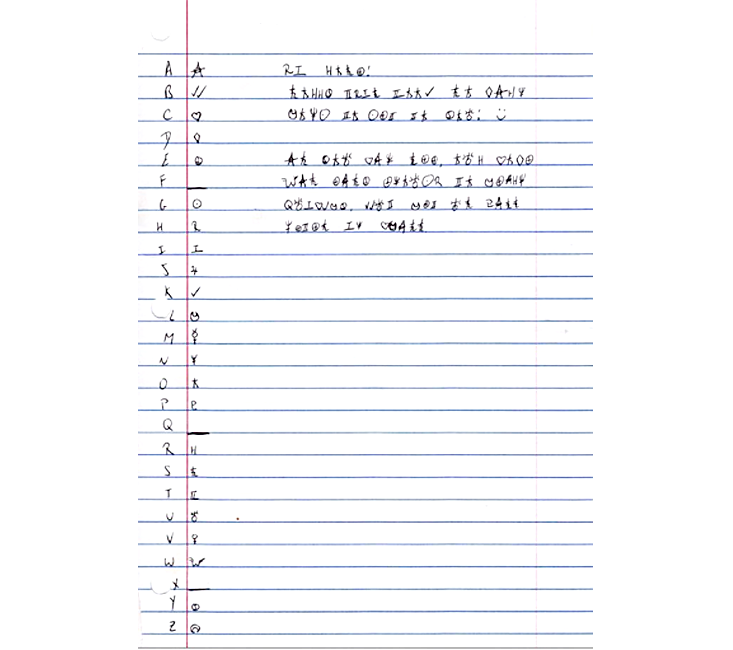Kids love secrets. There’s something deeply exciting about trying to keep information from others—especially adults—whether it’s with a code from a cereal box or one invented by a group of friends.
We asked our readers whether they had used any codes in their childhood. Here are a few that people can remember. Did you communicate in code in your youth? Tell us about your early adventures in encryption in the comments.
Dara Monasch and Meaghan Colleran: “The Code”
We wanted something quick and easy our group of friends could memorize with little trouble but that would still be just difficult enough that a teacher or non-friend (we were in middle to high school) couldn’t figure out the notes we were passing in class. A bunch of them are planetary symbols (we are Sailor Moon geeks to this day), others were borrowed from the Japanese alphabet, and some just made sense in other weird ways. This is how I can remember most of it; we wrote it to be logical to us.

Kate Yandell: “Rupbkejian”
The alphabet: yshfudjcogntzkirxpblewvqam, where y = a, s = b, etc.
My friend and I were sitting in her bedroom one day in 6th grade or so and decided we needed a new language. We switched vowels with vowels and consonants with consonants in an attempt to make it more pronounceable. We then asked my friend’s dad what we should call our language. He said, “Persnuggy,” or something like that. We translated it using our code but made some modifications to make the name sound better.
I remember sitting in class and writing my thoughts in Rupbkejian while feeling secure that people wouldn’t be able to look over my shoulder and tell what I was saying. It was a good way to write secret feelings and thoughts in plain sight! Probably many middle-schoolers would benefit from having a secret language.
The whole thing was part of a general middle-school craze for language. My friend and I soon got really into Spanish, which was way easier to pronounce that Rupbkejian and also felt like a fun code.
David Nussbaum: “Boaz’s Code”
I met Boaz when I was 5 years old. He was a shy, little 4-year-old but had the magical property of speaking English. I was visiting my grandparents in Haifa, a city nestled into the Carmel mountains in the north of Israel. I visited every summer for about a month, but despite the lovely Mediterranean beaches I was bored because none of the other kids around spoke any English and I spoke no Hebrew. Boaz’s parents had moved from Seattle in the ’70s, so he spoke English, and we became best friends.
Every summer this friendship blossomed again like magic. As we grew up, Boaz’s friends started learning English in school (and I picked up some Hebrew). Somehow, in the eyes of his friends, Boaz had turned me into this mythic creature that returned every summer from America (Canada, technically). It felt pretty nice coming from the relative anonymity of my life back home to this place where I was some kind of celebrity. Our status in the eyes of our friends gave something extra to our code, which was very simple, but nobody could seem to solve. When their frustration peaked we agreed to tell our friends, one at a time, on the grounds that they kept it a secret and, of course, in exchange for an ice cream. Even now I don’t feel totally comfortable telling you about it without demanding an ice cream in exchange, so I’ll put it on your tab.
Here’s the code. We told our friends that we were psychic. Boaz could think of a word, give me a list of five words and I would know which one he had been thinking of—and vice versa, of course. The simple trick was that the first letter of the first word would signal the serial position of the word in the list—if the first word was dog, the target word would be in the fourth slot. Later there were variations added, like that the key word was the fourth word instead of the first, or that it was the second letter of the word that held the signal, not the first. But it didn’t much matter; people weren’t getting much closer to guessing it. We also threw in a bunch of misdirection—winks and smiles and ear tugs that were completely irrelevant, but our friends were convinced they had cracked our code.
There was something about having that code that made us feel special, just the two of us. But we’ve always sort of felt that way together, and we’re still very close friends almost 30 years later. What was even cooler was how nice it was—after a frozen bribe, of course—to let other people into our exclusive club and see how happy it made them to be on the inside, too.






























